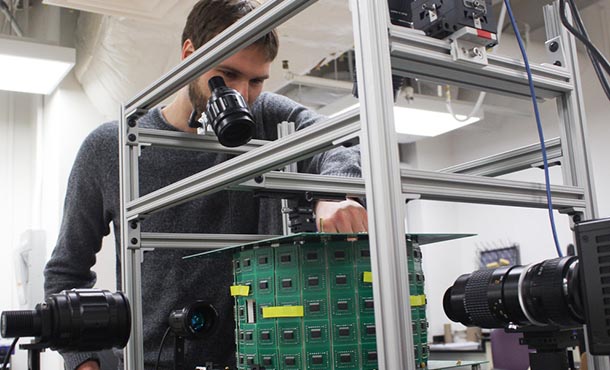
Jean-Michel Mongeau works with the virtual reality simulator for flying insects in his lab. IMAGE: ERIN CASSIDY HENDRICK
Engineering professor named Alfred P. Sloan Research Fellow
Jean-Michel Mongeau hopes to discover knowledge on how the brain controls movement to improve bio-inspired robotics
2/18/2021
By Erin Cassidy Hendrick
UNIVERSITY PARK, Pa. — Jean-Michel Mongeau, assistant professor of mechanical engineering, has been named an Alfred P. Sloan Research Fellow — the first Penn State College of Engineering researcher to receive the distinction.
According to the Alfred P. Sloan Foundation, the two-year, $75,000 fellowship “recognizes and rewards outstanding early-career faculty who have the potential to revolutionize their fields of study.”
“This fellowship will allow me to be more ambitious in pushing the frontier of my research,” Mongeau said.
In the Bio-Motion Systems Lab, Mongeau and his students investigate the adaptive neural control of locomotion of insects.
“We want to understand how brains — in this case, in insects — control movement,” he said. “Then, we want to use what we’ve learned from these animals to improve engineering.”
He explained that artificial intelligence (AI) has made significant strides in mimicking and sometimes surpassing human intelligence, but the same can’t be said for human movement.
“We’ve seen AI defeat the top chess players,” Mongeau said. “But a robot still can’t walk up to a chess board and pick up the pieces as well as a child. What explains this gap?”
According to Mongeau, the answers may be found in a sub-field he named “motor intelligence.” He aims to create a mathematical framework that couples neural signals and mechanical movements to allow robotic movements to be flexible, agile and robust.
For example, he studies fruit flies to understand how they adapt their movements when faced with a challenge, such as a damaged wing. Using a virtual-reality flight simulator he developed in his lab, he examines the changes in their flight behavior.
“For instance, when a person injures their leg, they adapt their walking to some extent,” Mongeau said. “With the same concept, when a fly loses a part of its wing, how does it change its flight behavior with that damaged limb?”
He will use those insights to quantify the control of sensing and movement in flies. Mongeau plans to go one step further, by identifying the neural basis of the phenomenon as well.
“We want to understand what changes are happening in the brain, is it processing information differently when a fly has wing damage?” Mongeau said. “We want to understand brain function on a deeper level, which could translate to a deeper understanding of how humans control their own movements.”
The Sloan Research Fellowships were first awarded in 1955 and remain one of the most prestigious honors available to early career researchers.
“A Sloan Research Fellow is a rising star, plain and simple,” Adam F. Falk, president of the Alfred P. Sloan Foundation, said. “To receive a fellowship is to be told by the scientific community that your achievements as a young scholar are already driving the research frontier.”
With this funding, Mongeau said it’s an honor for his entire lab and a recognition of his field of study.
“I’m thrilled by this recognition for my lab,” he said. “It’s also very humbling. This is really a win for my entire lab and my students’ hard work.”



